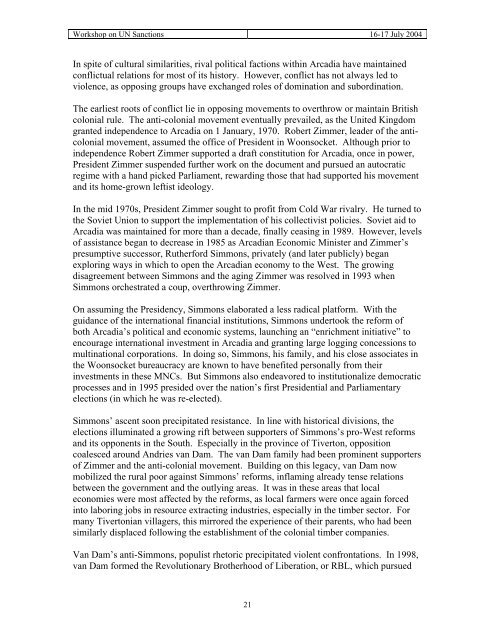UN Sanctions Reform - The Watson Institute for International Studies
UN Sanctions Reform - The Watson Institute for International Studies
UN Sanctions Reform - The Watson Institute for International Studies
You also want an ePaper? Increase the reach of your titles
YUMPU automatically turns print PDFs into web optimized ePapers that Google loves.
Workshop on <strong>UN</strong> <strong>Sanctions</strong> 16-17 July 2004<br />
In spite of cultural similarities, rival political factions within Arcadia have maintained<br />
conflictual relations <strong>for</strong> most of its history. However, conflict has not always led to<br />
violence, as opposing groups have exchanged roles of domination and subordination.<br />
<strong>The</strong> earliest roots of conflict lie in opposing movements to overthrow or maintain British<br />
colonial rule. <strong>The</strong> anti-colonial movement eventually prevailed, as the United Kingdom<br />
granted independence to Arcadia on 1 January, 1970. Robert Zimmer, leader of the anticolonial<br />
movement, assumed the office of President in Woonsocket. Although prior to<br />
independence Robert Zimmer supported a draft constitution <strong>for</strong> Arcadia, once in power,<br />
President Zimmer suspended further work on the document and pursued an autocratic<br />
regime with a hand picked Parliament, rewarding those that had supported his movement<br />
and its home-grown leftist ideology.<br />
In the mid 1970s, President Zimmer sought to profit from Cold War rivalry. He turned to<br />
the Soviet Union to support the implementation of his collectivist policies. Soviet aid to<br />
Arcadia was maintained <strong>for</strong> more than a decade, finally ceasing in 1989. However, levels<br />
of assistance began to decrease in 1985 as Arcadian Economic Minister and Zimmer’s<br />
presumptive successor, Ruther<strong>for</strong>d Simmons, privately (and later publicly) began<br />
exploring ways in which to open the Arcadian economy to the West. <strong>The</strong> growing<br />
disagreement between Simmons and the aging Zimmer was resolved in 1993 when<br />
Simmons orchestrated a coup, overthrowing Zimmer.<br />
On assuming the Presidency, Simmons elaborated a less radical plat<strong>for</strong>m. With the<br />
guidance of the international financial institutions, Simmons undertook the re<strong>for</strong>m of<br />
both Arcadia’s political and economic systems, launching an “enrichment initiative” to<br />
encourage international investment in Arcadia and granting large logging concessions to<br />
multinational corporations. In doing so, Simmons, his family, and his close associates in<br />
the Woonsocket bureaucracy are known to have benefited personally from their<br />
investments in these MNCs. But Simmons also endeavored to institutionalize democratic<br />
processes and in 1995 presided over the nation’s first Presidential and Parliamentary<br />
elections (in which he was re-elected).<br />
Simmons’ ascent soon precipitated resistance. In line with historical divisions, the<br />
elections illuminated a growing rift between supporters of Simmons’s pro-West re<strong>for</strong>ms<br />
and its opponents in the South. Especially in the province of Tiverton, opposition<br />
coalesced around Andries van Dam. <strong>The</strong> van Dam family had been prominent supporters<br />
of Zimmer and the anti-colonial movement. Building on this legacy, van Dam now<br />
mobilized the rural poor against Simmons’ re<strong>for</strong>ms, inflaming already tense relations<br />
between the government and the outlying areas. It was in these areas that local<br />
economies were most affected by the re<strong>for</strong>ms, as local farmers were once again <strong>for</strong>ced<br />
into laboring jobs in resource extracting industries, especially in the timber sector. For<br />
many Tivertonian villagers, this mirrored the experience of their parents, who had been<br />
similarly displaced following the establishment of the colonial timber companies.<br />
Van Dam’s anti-Simmons, populist rhetoric precipitated violent confrontations. In 1998,<br />
van Dam <strong>for</strong>med the Revolutionary Brotherhood of Liberation, or RBL, which pursued<br />
21
















